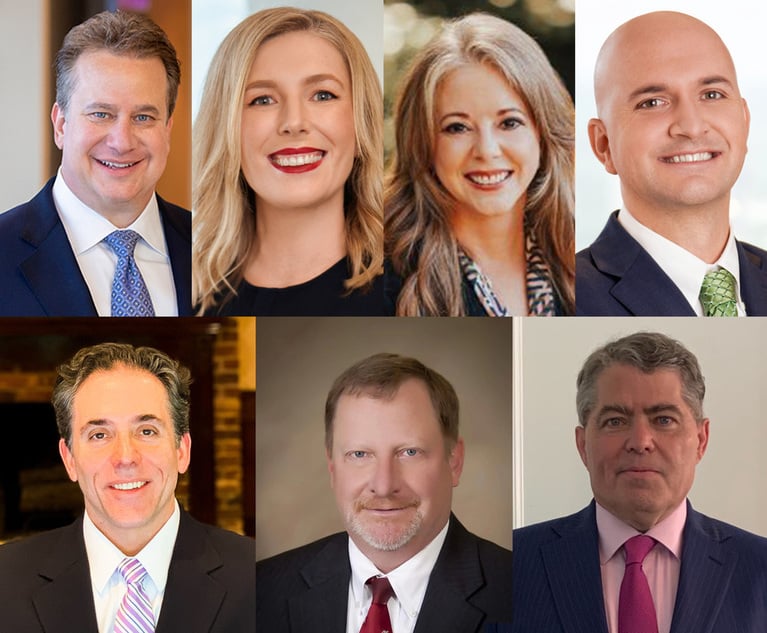 Jesse Evans, Cobb County deputy chief assistant district attorney. (Photo: Zach Porter/ALM)
Jesse Evans, Cobb County deputy chief assistant district attorney. (Photo: Zach Porter/ALM)Racial Slur Shocks Hearing in Ahmaud Arbery Murder Case
"That's some devastating evidence, but we don't know if it's going to be admissible," criminal defense attorney Page Pate observed.
June 04, 2020 at 03:33 PM
5 minute read
Language that the lawyers would not repeat ignited the livestreamed preliminary hearing Thursday for the three men charged with the murder of Ahmaud Arbery in Brunswick.
Two words. "F–king [N-word]."
That's what the witness testified the shooter was heard saying standing over Arbery as he lay dying on the ground.
Under direct examination from Cobb County Deputy Chief Assistant District Attorney Jesse Evans, Georgia Bureau of Investigation Special Agent in Charge Richard Dial told a story of three white men tracking Arbery as he ran—blocking him repeatedly from making turns that would have allowed him to continue on his path out of their subdivision across U.S.17 into his own neighborhood.
The story Dial told—based on the GBI's investigation—ended with the men trapping Arbery, 25, between two trucks, ordering him to "get on the ground" and then "killing him."
Travis McMichael, 34, his father, Gregory McMichael, 64, and their neighbor William "Roddie" Bryan Jr., 50 are all charged with murder in the death of Arbery on Feb. 23 in the Satilla Shores neighborhood near Brunswick. No arrests were made until May 7—after the release on social media of a video showing Arbery running, being confronted by two armed men, struggling briefly with one holding a shotgun, then dropping after three shots are heard.
After seeing the video, Gov. Brian Kemp and Attorney General Chris Carr directed GBI Director Vic Reynolds to offer the bureau's resources to a local DA—the third one assigned to the case after the first two recused themselves over conflicts of interest. Within two days of the state taking over the investigation, the McMichaels were arrested. Bryan's arrest followed on May 22.
Bryan made the video that led to the arrests. But the police have a much longer video than the portion Bryan and Greg McMichael arranged to have leaked, according to Dial's testimony. Dial said Bryan repeatedly blocked Arbery's path, preventing him from running toward his own home until finally his path was cut off by Greg McMichael's truck in front of Bryan's.
The video shows Travis McMichael with a shotgun in a confrontation with Arbery and Greg McMichael standing in the back of a truck with a handgun. Dial testified that the father was "covering" his son.
Travis McMichael's defense co-counsel Jason Sheffield of Peters, Rubin, Sheffield & Hodges in Atlanta was the first to cross-examine Dial.
Sheffield tried to mitigate what he called "that awful term" by asking Dial if he had ever heard about Travis McMichael using such language in other instances.
Yes, Dial answered. "Many times," he said.
Dial said the investigation found multiple posts on social media using the same slur before the shooting. He said they found them on Travis McMichael's cellphone and social media sites—both before and after Arbery's death.
Sheffield asked Dial if he knew that Travis McMichael had worked with African Americans while on duty in the Coast Guard.
Dial said he didn't know about that. But he did know Travis Michael said he "loved being on a boat because there are no N-words anywhere."
Sheffield moved on to other questions that gave a preview of the defense strategy. He asked Dial if he was aware of mental health problems that Arbery suffered. Evans objected. Magistrate Judge Wallace Harrell said it was "almost immaterial" but allowed it. Dial said Arbery had auditory hallucinations at one time, but that was not related to what happened the day he died.
Sheffield asked a series of questions about the McMichaels' suspicion that Arbery could have been behind burglaries in the neighborhood, because he was seen on security video walking into a house under construction. Dial answered that he found no evidence of anything being taken. Sheffield asked if anything has to be stolen in order to commit burglary.
Sheffield also asked questions suggesting Travis McMichael acted in self-defense in a struggle over his shotgun with Arbery. But Dial said the first shot hit Arbery in the chest, evidenced in the video by blood spreading over his white shirt and that the brief struggle over the gun was between the first shot and two more.
Dial also testified that Greg McMichael could be heard on the video telling his son, "Don't shoot."
Whether the video also picked up the racial slur will be an important point going forward, according to criminal defense attorney Page Pate, who is not involved in the case but has offices in Brunswick and Atlanta.
"That's some devastating evidence, but we don't know if it's going to be admissible," Pate said.
If all three defendants are tried together, Bryan will not have to testify, and the slur will become hearsay. If it's on the video, it is admissible.
Pate said the defense attorneys' questions were much broader and more open in the preliminary hearing than they would be at trial.
"The preliminary hearing is more like a deposition," Pate said. "Better to hear it now than later."
This content has been archived. It is available through our partners, LexisNexis® and Bloomberg Law.
To view this content, please continue to their sites.
Not a Lexis Subscriber?
Subscribe Now
Not a Bloomberg Law Subscriber?
Subscribe Now
NOT FOR REPRINT
© 2024 ALM Global, LLC, All Rights Reserved. Request academic re-use from www.copyright.com. All other uses, submit a request to [email protected]. For more information visit Asset & Logo Licensing.
You Might Like
View All

Fowler White Burnett Opens Jacksonville Office Focused on Transportation Practice
3 minute read
On The Move: Polsinelli Adds Health Care Litigator in Nashville, Ex-SEC Enforcer Joins BCLP in Atlanta
6 minute read
Woman's Suit Alleging Negligence to Sex Trafficking by Hotel Tossed by Federal Judge
Trending Stories
- 1How Marsh McLennan's Small But Mighty Legal Innovation Team Builds Solutions That Bring Joy
- 2When Police Destroy Property, Is It a 'Taking'? Maybe So, Say Sotomayor, Gorsuch
- 3New York Top Court Says Clickwrap Assent Binds Plaintiff's Personal-Injury Claim to Arbitration in Uber Case
- 4'You Can’t Do a First Draft of Common Sense': Microsoft GC Jon Palmer Talks AI, Litigation, and Leadership
- 5About the Awards: Southeastern Legal Awards Q&A with Regional Managing Editor Michael Marciano
Who Got The Work
Michael G. Bongiorno, Andrew Scott Dulberg and Elizabeth E. Driscoll from Wilmer Cutler Pickering Hale and Dorr have stepped in to represent Symbotic Inc., an A.I.-enabled technology platform that focuses on increasing supply chain efficiency, and other defendants in a pending shareholder derivative lawsuit. The case, filed Oct. 2 in Massachusetts District Court by the Brown Law Firm on behalf of Stephen Austen, accuses certain officers and directors of misleading investors in regard to Symbotic's potential for margin growth by failing to disclose that the company was not equipped to timely deploy its systems or manage expenses through project delays. The case, assigned to U.S. District Judge Nathaniel M. Gorton, is 1:24-cv-12522, Austen v. Cohen et al.
Who Got The Work
Edmund Polubinski and Marie Killmond of Davis Polk & Wardwell have entered appearances for data platform software development company MongoDB and other defendants in a pending shareholder derivative lawsuit. The action, filed Oct. 7 in New York Southern District Court by the Brown Law Firm, accuses the company's directors and/or officers of falsely expressing confidence in the company’s restructuring of its sales incentive plan and downplaying the severity of decreases in its upfront commitments. The case is 1:24-cv-07594, Roy v. Ittycheria et al.
Who Got The Work
Amy O. Bruchs and Kurt F. Ellison of Michael Best & Friedrich have entered appearances for Epic Systems Corp. in a pending employment discrimination lawsuit. The suit was filed Sept. 7 in Wisconsin Western District Court by Levine Eisberner LLC and Siri & Glimstad on behalf of a project manager who claims that he was wrongfully terminated after applying for a religious exemption to the defendant's COVID-19 vaccine mandate. The case, assigned to U.S. Magistrate Judge Anita Marie Boor, is 3:24-cv-00630, Secker, Nathan v. Epic Systems Corporation.
Who Got The Work
David X. Sullivan, Thomas J. Finn and Gregory A. Hall from McCarter & English have entered appearances for Sunrun Installation Services in a pending civil rights lawsuit. The complaint was filed Sept. 4 in Connecticut District Court by attorney Robert M. Berke on behalf of former employee George Edward Steins, who was arrested and charged with employing an unregistered home improvement salesperson. The complaint alleges that had Sunrun informed the Connecticut Department of Consumer Protection that the plaintiff's employment had ended in 2017 and that he no longer held Sunrun's home improvement contractor license, he would not have been hit with charges, which were dismissed in May 2024. The case, assigned to U.S. District Judge Jeffrey A. Meyer, is 3:24-cv-01423, Steins v. Sunrun, Inc. et al.
Who Got The Work
Greenberg Traurig shareholder Joshua L. Raskin has entered an appearance for boohoo.com UK Ltd. in a pending patent infringement lawsuit. The suit, filed Sept. 3 in Texas Eastern District Court by Rozier Hardt McDonough on behalf of Alto Dynamics, asserts five patents related to an online shopping platform. The case, assigned to U.S. District Judge Rodney Gilstrap, is 2:24-cv-00719, Alto Dynamics, LLC v. boohoo.com UK Limited.
Featured Firms
Law Offices of Gary Martin Hays & Associates, P.C.
(470) 294-1674
Law Offices of Mark E. Salomone
(857) 444-6468
Smith & Hassler
(713) 739-1250






